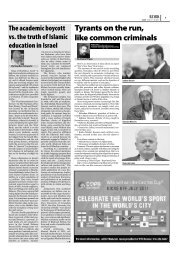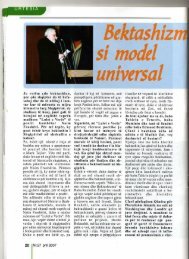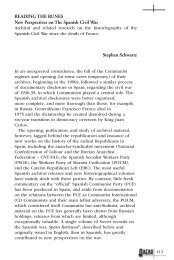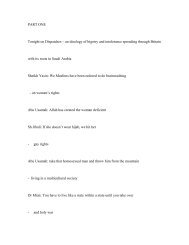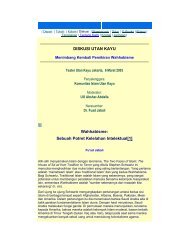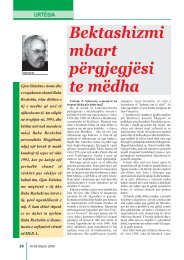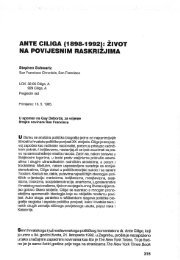The Other Islam - Center for Islamic Pluralism
The Other Islam - Center for Islamic Pluralism
The Other Islam - Center for Islamic Pluralism
Create successful ePaper yourself
Turn your PDF publications into a flip-book with our unique Google optimized e-Paper software.
Book Reviews / International Journal of Public <strong>The</strong>ology 6 (2012) 255–264 257<br />
Stephen Schwartz, <strong>The</strong> <strong>Other</strong> <strong>Islam</strong>: Sufijism and the Road to Global Harmony (New York<br />
and London: Doubleday, 2008), pp. x + 275, £15.94, ISBN 978-0385518192 (hbk).<br />
<strong>The</strong> <strong>Other</strong> <strong>Islam</strong>: Sufijism and the Road to Global Harmony is an ambitious and inspired<br />
intellectual endeavour on many levels. In this work Stephen Schwartz undertakes to<br />
encapsulate on an encyclopaedic scale the story of Sufijism, one of the most fascinating<br />
and so far relatively unknown and largely ignored, underestimated, abused and often<br />
persecuted ‘sects’ of <strong>Islam</strong> both in the Muslim world and globally, covering almost<br />
everything of importance regarding its achievements and setbacks from its inception<br />
in the twelfth century (perhaps earlier) until the start of the twenty-fijirst century.<br />
According to Schwartz, Sufijism has contributed considerably in spreading <strong>Islam</strong> perhaps<br />
from the time of the Prophet Muhammad and the four Caliphs onwards. It is<br />
debatable whether, as Schwartz often claims, <strong>Islam</strong> spread across the globe primarily<br />
through peaceful means, but Schwartz makes a strong case in this book that <strong>Islam</strong> owes<br />
much of its expansion to the peaceful preaching of Sufiji orders. So, <strong>for</strong> instance, he<br />
holds that, following the destruction of the Baghdad caliphate in 1258, it was mainly by<br />
the Sufiji path that, like their ethnic Turkic cousins, the Mongol rulers of Iran and Iraq<br />
came to <strong>Islam</strong> (pp. 123–4).<br />
Schwartz sees Sufijism as an early genuine eff<strong>for</strong>t on the part of some Muslim scholars<br />
and mystics to offfer some <strong>for</strong>m of resistance to tendencies to ‘Arabize’ <strong>Islam</strong> and Sufiji<br />
orders, and as a manifestation of <strong>Islam</strong>ic pluralism. <strong>The</strong> grouping of Sufiji students, after<br />
Sufiji mysticism became institutionalized in <strong>Islam</strong>, argues Schwartz, is indicative of what<br />
Sufijism has in common with Christian monastic institutions, the Jewish schools of traditional<br />
Kabbalah and sacred communities of Chasidism (p. 8). In this context, referring<br />
to Khalid Durán, one of the most important points Schwartz highlights in his<br />
book is the claim equating the rise of Sufijism with protests against corruption and<br />
wealth (p. 40). This, together with the ‘fracture’ running through <strong>Islam</strong>ic history<br />
between the ‘legalists’, who are hunters of heresy and haters, and the mystics, who are<br />
pluralists and lovers, indicates that the early students of Sufijism were, to some extent,<br />
trying to do <strong>for</strong> <strong>Islam</strong> what Franciscans and Dominicans in the thirteen century were<br />
doing <strong>for</strong> Christianity: preach the signifijicance of leading a simple and fully devoted<br />
religious life at a time when it was becoming obvious that the church was becoming<br />
increasingly concerned with amassing wealth, a tendency which, as it became stronger,<br />
was one of the reasons that led to Re<strong>for</strong>mation.<br />
Schwartz’s book is a welcome publication at a time when, following the terrorist<br />
attacks on the United States on 11 September 2001, misperceptions of and bigotry<br />
against <strong>Islam</strong> and Muslims have increased, especially in the global west. Yet, the book<br />
is not intended to exonerate <strong>Islam</strong>; one of its purposes is to in<strong>for</strong>m readers of how little<br />
they know of a faith that continues to be largely misunderstood, pigeonholed and<br />
demonized as a result of externals as much as internal factors. Likewise, Schwartz is<br />
critical of Sufiji scholars who, in his view, fail to realize what Sufijis have contributed to<br />
© Koninklijke Brill NV, Leiden, 2012 DOI: 10.1163/156973212X635118
258 Book Reviews / International Journal of Public <strong>The</strong>ology 6 (2012) 255–264<br />
<strong>Islam</strong>. In referring to the Sufiji scholar G. F. Haddad of the Naqshbandi order, Schwarz is<br />
critical of his attempt to ‘enclose Sufijism in a framework of orthodoxy’ (p. 151).<br />
Schwartz believes that Sufijis’ traditional superior adherence to legal and intellectual<br />
pluralism makes it more imperative <strong>for</strong> the west to ‘abandon dismissive insults’ (p. 29)<br />
about Sufijism as ‘folk <strong>Islam</strong>’, especially now when it has become clear that relations<br />
with the community of Muhammad can no longer be handled only through Sunni and<br />
Shia intermediaries. Sufijism is a natural bridge builder between <strong>Islam</strong> and the global<br />
west; in particular, they need each other to win ‘their common battle against <strong>Islam</strong>ist<br />
radicalism’.<br />
One of Schwartz’s claims that will take by surprise readers influenced by the ‘<strong>Islam</strong>as-a-threat’<br />
discourse, is that <strong>Islam</strong>, as the history of Sufijism reveals, has from the start<br />
attempted, sometimes successfully and other times less so, to foster pluralism in its<br />
midst, that it has benefijited from and inspired both Jewish and Christian mysticism,<br />
and that it has influenced and inspired some of the best writers in the global west<br />
including Dante, Emerson, Whitman, Thoreau and Lessing.<br />
One cannot help thinking after reading this book that rather than a two-branch<br />
faith—Sunni and Shi’ite—<strong>Islam</strong> is a three-branch religion: Sunni, Shi’ite and Sufiji. I<br />
understand this is not the reason Schwartz wrote the book, neither is it what he believes<br />
he has conveyed in the work. <strong>The</strong> best of books, in my view, generate their own meanings.<br />
<strong>The</strong> fact that <strong>The</strong> <strong>Other</strong> <strong>Islam</strong> is such a book is yet another proof of Schwartz’s<br />
outstanding erudition and veneration <strong>for</strong> <strong>Islam</strong> in general and especially Sufijism as an<br />
important player in our collective endeavours to achieve global harmony.<br />
Gëzim Alpion<br />
University of Birmingham, UK



